#north west frontier province
Explore tagged Tumblr posts
Text



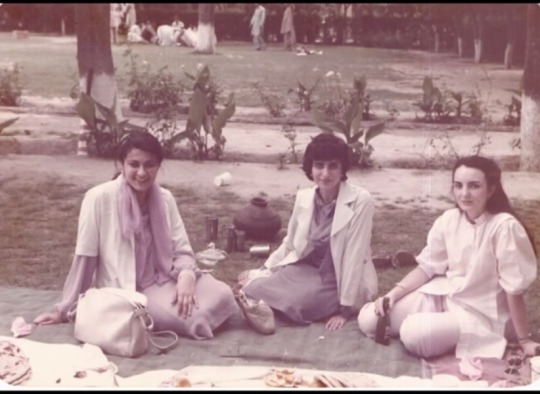
Female medical students, Peshawar, early 80s
#medical students#women in medicine#Peshawar#pekhawar#khyber medical college#khyber pakhtunkhwa#kpk#north west frontier province#pashtun#80s#Pakistan#this is somewhere between 1979 and 1984#own post
245 notes
·
View notes
Text

Forsterite Var Peridot & Magnetite | Naran, Kaghan Valley, Mansehra District, North West Frontier Province, Pakistan
404 notes
·
View notes
Text
Main lore of Encounters in the Frontier
In this pinned post I will introduce the main historical chronology and concepts of the setting.
Most of the events take place in a subcontinent with the general size, shape and latitude of India, wich is a penninsula of a larger megacontinent wich occupies most of the northern hemisphere. This subcontinent, wich I will just call the penninsula, has a shallow sea to the east, another to the west, steppe and large mountains to the north and a deep and vast ocean to the south, wich eventually leads to the land of alwaysummer. At the eastern sea are the twisted islands. The penninsula has dense forests to the northeast, jungles to the southeast and the western coast is more dry and desserted. the northwest has the plateau, a large elevated plains regions, spotted with forests and the centre of the continent is hilly and mountainous.
By this time the Empire controlled many religions and peoples, in some cases loosely, and revolts had to be almost constantly supressed in the western and southern provinces. The central mountain range, southwestern dessert, northwestern plateau and norterns steppe were their most unstable frontiers, as well as eastern pirates from the Twisted Islands.
The Sun Empire had a humble origin as a city state in the southeast wich fought for its independence and won against a nomadic invador from the north. The years of foreign control made them realize their vulnerability and they began to rapidly militarize. For the Sun Empire, the best deffense was a good offense and they rapidly annexed the nearests city states in a rapid expansion. In their culture, war justified itself. They generally arrived at a city and offered them to surrender in good terms or be suffer very bad taxations and treatment after their defeat. Many chose the first option. At this time, certain warrior families began to rise to power and formed a warrior class wich selected a military leader from among themselves. There was also a very powerfull priest class, wich ended up concentrating into a single dynasty and also chose a leader from among themselves (Although the role ended up being inherited mostly). These two roles complimented each other. The military leader managed external politics and the executive power, while the priest leader managed internal politics and the juditial and legislative power, as well as of course, managing religious festivities and such. These two roles were imagined as being a husband and a wife (the priest leader was often a woman, since politics is considered a woman's job), the state a family and their population their children.The Empire spread westwards and managed to control one of the richest cities of the penninsula, Odras. This city lays under the plateau and is a hub from inland commerce and connects the trade routes of the eastern and western seas. They retained their religion and strong identity, wich had significant influence on the rest of the Sun Empire. By this time the Sun Empire's religion was politheistic with the sun god as the head of the pantheon.
Now I will introduce the Twisted Islands and the magic system of the setting:
If you have ever been introduced to the concept of the fourth dimension or wormholes it was probably by the folded paper pierced by a pencil analogy.

This setting's shape is more like this:

Some parts of the world seem to be closer in the 4D plane than others, and wormholes are more likely to appear between them. Some regions have deeper folds and portals will be more common, while others are "flatter" and there will be almost no chance of one appearing. In this world, the Twisted Islands have the most and deepests "folds", so portals appear often, sometimes on their own and connect to many places.
The Twisted Islands are an archipellago of mostly very small atolls and poor in natural resources (except fish and shellfish I guess). Still, the portal's influence in the region is very apparent to the naked eye. Rock formations take impossible shapes, caves are larger than the cliff that contains them, trees grow upside down… so they attracted many sea peoples, wich settled in them for religious reasons. The islands often only held a small population of ascetic monks, wich sustained themselves with donations from pilgrims, wich mainly came from larger, less portal-active islands and lands, wich is where most of the Twisted Island's population is originally from, it's rare for people to be born in the islands proper.
Portals don't usually open on their own, and require energy input, such as a strong fire. Monks would place an offer over the fire, raise the temperature and the offer woud suddenly disappear with a flash of light, and sometimes something else would appear on its place (most often just rocks that don't match those of the island, but enough to impress anyone that sees it). Slowly, their methods became more refined and they could locate, open and predict where an object would go more reliably. The peoples of the Twisted Islands were also known as great sailors, good at sea trading and wich could venture into the open sea, while those from the Empire only sailed next to the shoreline.
Managing portals was a dangerous task, reserved only for the elite of the monasteries, trained for years. It could result in untreatable portal wounds, in wich a limb mantains it's function but becomes "twisted". This modified limb seemed useful in locating portals and their shape and angle, so some monks started modifying themselves on purpose, thought this is shunned by most.



Ok, so those were the basis of most regions before the Dragon Age, a period of ecological and political change. It started with the explosion of a megavolvano in a distant, unknown land, wich caused a volcanic night in the penninsula. This resulted in a widespread famine through the continent… then came the dragons



Dragons were probably native to the land were the volcano exploded and came looking for a new home. They eated cattle, wild megafauna and tragically often humans at an unsustainable rate. They mainly settled in the central mountain ranges of the penninsula and the northern steppe, wich caused mass migration from these lands. These migrations were often violent and caused great damage to the already in crisis Empire.
The first encounter with a dragon happened in a frontier fortress south of the plateau, wich was taken by a dragon at night and its inhabitants devoured. The dragon took the fortress as a nest to lay eggs. The Empire, after comunication with the fortress was cut, asumed it had been taken by a plateau tribe and sent a small platoon of soldiers to retake it (dragons were only a rumor atp). The whole platoon was massacred by the dragon.
At the north, the nomads united under a charismatic ruler called Saljar, wich conquered a big chunk of the Empire's land. In an almost suicide mission, the already desperate and decaying Empire went all in against this king from the north. This campaign was full of tensions and during their travel north, guerilla attacks from rebellious regions and dragons weakened both armies. The unpopular military ruler died right before battle (most likely secretly poisoned by the Ashiva, the priest ruler as the military leader was the one that made the bad desition of starting this campaign) and it seemed like all hope was lost, but Ashiva, took control and led the army into battle (a very desperatel move). During the battle two dragons started fighting eachother while flying on top of them and fell mid fight on top of the nomad troops, causing them to break formation and flee. Its said that Ashiva himself killed the feared Saljar. Ashiva became very popular and took supreme control of the Empire, claiming to be the Sun God personified.
Still, the Empire had many problems to adress, such as the dragons (all military efforts to hunt them ended in disaster) and the former army of Saljar, now dispersed in small armies, wich sacked the Empire's towns. Ashiva, proving to be a very capable diplomat, managed to organize a meeting with these warbands, where he recalled the fight of the dragons over their own armies, and claimed that, in the same way that these beast both died while fighting, so would they if they don't adress the dragons. Ashiva proposed that these war bands start to hunt the dragons and bring their heads to him, in exchange, the Empire would grant them power over their lands. The nomadic light camelry proved to be very effective at hunting dragons and they soon became powerful noble families and settled mainly in the frontier lands or rebellious regions of the Empire to "pacify them" (It's known that the natives of these regions considered their new rulers worse than the dragons).
It took about 120 years to hunt most dragons and end the dragon age. During this time the Empire was ruled by Ashiva's divine and absolute dynasty. The new Dragon Nobility became increasingly powerful and the danger of a coup d'etat was very real. The plateau and northern coast of Alwaysummer were conquered during this period.
During the mid Dragon Age, the most powerful monastery of the twisted islands learned how to reliably send objects through portals (if a living creatures is sent through a portal ir appears dead on the other side). The chief of that monastery sent a message through the portals to every other monastery of the archipellago, calling them for a meeting to show them how to do it. This meeting was known as The Call. The comercial use of the portals was immediatly exploited and the twisted islands unify and become the major hub of trade of this world. Diplomatic trips from the archipellago reached many distant lands to set portal openings and trade centers (the envoys were met with varied reactions, sometimes welcomed, rejected, or straight up killed). These portals were specially useful for sending messages and the rivalry between the Empire and the Islands only increased from now.

#fantasy worldbuilding#spec evo#worldbuilding#art#concept art#lore#oc lore#alt history#encounters in the frontier#dragon#fantasy#fantasy art
36 notes
·
View notes
Text
The Chariots Roll[1]
By Du Fu (712 - 770)
Chariots rumble, horses neigh,
Conscripts with bows and arrows at their waists stay.
Parents, wives, children, all run out to wave goodbye,
Xianyang Bridge[2] shrouded in dust, hides away.
Clothes gripped, feet stomp, they block the way,
Their wails ascend, piercing through the cloudy day.
A passerby[3] by the roadside queries a conscripted man,
The man responds, “Drafts continue without end.
From fifteen, we march north to guard the river's bend,[4]
Until forty, we till the fields of the western land.[5]
Our lizheng wrapped our heads as we departed,[6]
Returning with white hair, we guard the border still.
The border outposts bleed, an ocean charted,
Yet the Martial Emperor's thirst for expansion remains unfulfilled.[7]
Sir, have you not heard of Han’s provinces east of the mountains,[8] two hundred strong,
Where thousands of villages and hamlets, brambles and thorns belong.
Though strong women wield hoes and ploughs with might,
The fields' crops grow wild, chaos in sight.
And the soldiers of Qin, in battles they brave,
Driven like dogs and chickens, no difference in their fate.
Though you, elder, may inquire with care,
Can a conscript dare voice his despair?
In this winter, west of the Pass,[9]
Soldiers still await their rest.
County officials demand their share,
But whence do taxes and rents flare?
Know that bearing a son brings distress,
While having a daughter is a prize blessed.
A daughter, at least, can wed a neighbor,
But a son will be buried among the hundred grasses.
Sir, have you not seen Qinghai's edge so vast?
Through the ages, white bones untouched and cast.
New ghosts mourn, old spirits weep,
In the mist and rain, their cries seep, wailing, wailing.”
[1] The Chariots Roll, written by Du Fu (712-770) during the Tianbao period (742-756) of the Tang Dynasty, likely in 751, captures a turbulent era marked by the Tang Empire's frequent military campaigns against ethnic minorities in the southwestern regions. In 751, under the command of General Xianyu Zhongtong, an army of 80,000 suffered a devastating defeat at the hands of Nanzhao, resulting in the loss of 60,000 soldiers. To replenish the severely diminished forces, the principal chancellor, Yang Guozhong, initiated an impressment campaign, involving the coercive drafting of civilians, who were bound in chains and sent to military camps. This poem poignantly reflects the harsh realities and human suffering brought about by these historical events.
[2] The Xianyang Bridge was built by Emperor Wu of the Han Dynasty. It was located southwest of present-day Xianyang City in Shaanxi Province. It served as a vital route for travel from Chang'an to the northwestern regions.
[3] Refers to Du Fu himself.
[4] During the 750s, the Tang Dynasty frequently clashed with the Tibetan Empire. Tang troops from the Longyou, Guanzhong, and Shuofang regions were strategically stationed west of the Yellow River to defend against Tibetan incursions.
[5] Under the tuntian system, troops were sent to harsh frontier landscapes with the objective of transforming uncultivated land into self-sustaining agrarian settler colonies. This was also a measure to defend against Tibetan incursions.
[6] In the Tang Dynasty, for every one hundred households, an official called lizheng (里正) was appointed. The lizheng was responsible for managing household registrations, overseeing civil affairs, and urging the completion of tax and labor duties. Young recruits needed the assistance of a lizheng to wrap their heads with a three-chi-long black silk.
[7] In Tang poetry, it was common to use "Han" as a euphemism for the Tang Dynasty. Therefore, the term "Martial Emperor" (or Emperor Wu of Han) is used to refer to Emperor Xuanzong of the Tang Dynasty. "Han" in the following line also refers to the Tang Dynasty.
[8] Mount Xiao and Mount Hua.
[9] The Hangu Pass.
兵车行 杜甫 车辚辚,马萧萧,行人弓箭各在腰。 耶娘妻子走相送,尘埃不见咸阳桥。 牵衣顿足拦道哭,哭声直上干云霄。 道旁过者问行人,行人但云点行频。 或从十五北防河,便至四十西营田。 去时里正与裹头,归来头白还戍边。 边庭流血成海水,武皇开边意未已。 君不闻汉家山东二百州,千村万落生荆杞。 纵有健妇把锄犁,禾生陇亩无东西。 况复秦兵耐苦战,被驱不异犬与鸡。 长者虽有问,役夫敢申恨? 且如今年冬,未休关西卒。 县官急索租,租税从何出? 信知生男恶,反是生女好。 生女犹得嫁比邻,生男埋没随百草。 君不见,青海头,古来白骨无人收。 新鬼烦冤旧鬼哭,天阴雨湿声啾啾!
7 notes
·
View notes
Text
I already did a post like this a while ago, but since I have since come up with versions I like better I'm doing it again. So here is a series of portraits of the protagonist of a dinopunk sword and sorcery story I'm currently planning out, done as best I can with the character customization options and armors in Conan Exiles. I also used mods.

Kuda was born in a western frontier province of Qitai (fantasy-China), to an impoverished peasant family in a region ravaged by warfare between two local warlords. She was sold at a young age to a foreign trading caravan that was passing through the region for money to feed her siblings, but as she was being transported west to be sold into slavery the caravan was raided by a tribe of steppe nomads called the Staaka (fantasy-Scythians), one of whom decided to adopt her to raise as his own. It was among the Staaka that she got her name; I haven't nailed down her original Qitan name yet, because by the time of the story she barely remembers it anyway.
Also, the Staaka ride domesticated horse-sized alioramin tyrannosaurs:


Rule of Cool is fully in effect in this setting.


Among the Staaka Kuda grew into a fearsome warrior, participating in many raids, killing many people, selling people into slavery, and performing ritualized cannibalism. By our standards, she is not a good person at this stage of her life by any stretch of the imagination. By Staaka standards, she's pretty awesome. Also at some point she falls in love with one of her fellow warrior women.


Unfortunately, since this is a story, and stories need conflict, the Staaka are eventually attacked and defeated by a larger nomad tribe, Kuda's girlfriend is killed, and she and the other survivors get a taste of their own medicine when they're marched off to the nearest fantasy-Greek colony and sold into slavery themselves. From there, Kuda is taken south to Khimt (fantasy-Egypt), where she is bought by a local minor noble.
Her actual tattoos in the story would more closely resemble real Scythian tattoos, just with dinosaurs instead of deer and panthers and shit. There used to be a mod that added actual Scythian tattoo designs into the game, but it no longer works. So I used the ones shown here because I think they look neat.


Eventually the noble's wife got tired of this EXOTIC FOREIGN TEMPTRESS prancing about the estate and tempting her husband (never mind that Kuda hated both their guts), so she nagged him into sending her south as a gift to a friend of theirs who was governor of a far-flung colony. Unfortunately during the trip the galley she was on was attacked and sunk, so she never made it there. Instead she washed ashore on Alkebu (fantasy-Africa), where she was found by a local tribe called the Irombe. She lived with the Irombe for a time, during which she proved herself as a capable warrior and was given the ritual scarification to mark her as such.

Eventually though her nomadic upbringing had her itching to move on, not to mention her unfinished business on the steppes: find and kill the man who'd killed her girlfriend. So she got passage with a passing tribe of Ouled-Nail-inspired nomads and headed north.
Kuda eventually made her way back to the steppes, where she managed to join another nomadic tribe who were opposed to the one that had attacked her people. She rode with them for a while until the two groups finally clashed, and she was finally able to take her revenge. Finally, after killing her hated enemy and having a drinking bowl made from the top of his skull in the tradition of her adopted people, she visited the site of her tribe's defeat and then left the steppes to see more of the world.


Her wandering eventually took her to the coastal city-state of Dar-Shelem, where she takes a job as a mercenary escorting the king's daughter to an arranged marriage to a prince in the neighboring empire of Matuwali.

And the princess, Yemsher, is the story's narrator. Being an inquisitive and bookish girl, she immediately becomes curious about the exotic-looking female warrior in her retinue and eventually gets her to recount her life story to pass time on the journey. The story would then be Yemsher's account of everything she was told, written down at the encouragement of her new husband who just so happens to also be a huge fucking nerd.
And that's the story as I currently have it outlined. I'm not worried about spoilers because anyone who reads all this will probably completely forget about it by the time I actually get around to writing the damn thing.
Also because one person has already asked, no, I'm not planning on the two of them hooking up. Though given Matuwali and Staaka attitudes towards sex Yemsher could probably have Kuda as a sidepiece if she wanted. (I'll leave that up to the fanfic authors.)
2 notes
·
View notes
Text
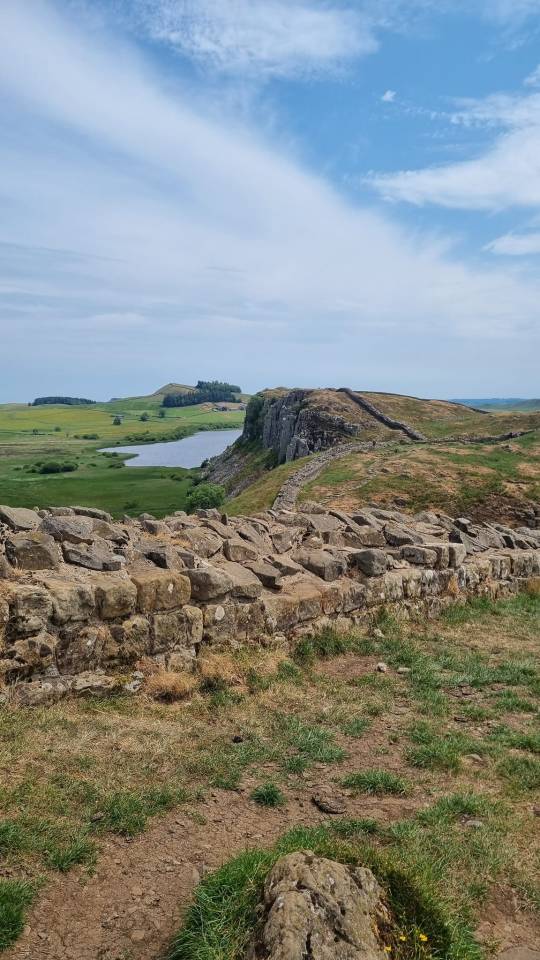
Hadrian's Wall was built in c. AD 122 on the orders of Emperor Hadrian. Today, the Wall runs across northern England, but when it was built, it was the northern frontier of the Roman province of Britannia. With the exception of a couple of decades in the mid-2nd century AD, Hadrian's Wall was the north-west frontier of the Roman Empire for approximately 300 years. It was built to separate the Romans from the Barbarians¹ and may have been built in response to guerrilla warfare waged by the natives. It was certainly built to secure the border and control the movement of people in and out of the Empire.
The Wall is believed to have taken about six years to complete, although it would continue to change and evolve for decades after completion. Initially, some parts were built from timber and turf and others in stone. Eventually, the entire Wall, from Maia in the west to Segedunum in the east, was built in stone. In front of the Wall, where there were otherwise no natural features for protection such as rivers or cliffs, the Romans dug a deep ditch. Behind the Wall was the Vallum, which was an earthwork that comprised two banks of earth with a deep ditch in between. The Vallum stretched almost the entire length of the Wall, over 70 miles, and probably defined the rear of the Wall-zone.
The height of Hadrian's Wall is difficult to know because so little of it remains. It probably varied depending on the terrain. For example, the Wall as it crossed the high cliffs of the Whin Sill was possibly about 4-4.6 metres high (13-15 feet) and slightly higher—possibly 4.6-5.5 metres (15-18 feet) or more—when it crossed easily traversed terrain.
Hadrian's Wall has been used as a quarry since it was abandoned. Today, only about 10% of the Wall remains, and the sections of wall that have survived stand at a height of just 1-2 metres in most places. However, as recently as the 16th century there was a section of Wall standing 5 metres high (16 feet) near Bowness-on-Solway. Samson Erdeswick records in 1574:
"Begyning abowt a town called Bonus [Bowness-on-Solway] standing vppon the river Sulway now called Eden, and there yet standing of the heyth of 16 fote, for almost a quarter of a myle together, and so along the river syde estwards."
William Camden (16/17th century):
"Within two furlongs of Caervoran, on a pretty high hill the Wall is still standing, fifteen feet in height, and nine in breadth."
Bede (7/8th century):
"It is eight feet in breadth, and twelve in height, in a straight line from east to west, as is still visible to beholders."
These writers lived many centuries after the Roman military abandoned Britain. Even Bede, the earliest reference to the height I have used, was writing some 300 years after the Roman military had left Britain. Thus, the Wall might have lost a few feet in height in places by his day.
With regard to thickness, Hadrian's Wall was up to 3 metres (over 9 feet) thick, but again, it varied. Some sections were about 2.5 metres thick (8 feet), and other sections narrower.
In its day, Hadrian's Wall was an impressive 73-mile-long (80 Roman miles) stone structure with no fewer than 16 large forts, 80 milecastles, and about 160 turrets. It crossed over rivers, hills, and along cliffs, from the west coast to the banks of the River Tyne in the east.
An unbelievable structure that survives from the ancient world.
Location: above Sycamore Gap looking east.
Source:International Man of History/FB page
3 notes
·
View notes
Text
Account of Funan (LS54)
[And other lands even further away.
Funan was located at the southern coast of what is now Cambodia and Vietnam, the great river referred to must be the Mekong.
Dunxun is presumably southern parts of modern Myanmar.]
The state of Funan is located within the great bay west of the sea south of Rinan commandery. The distance to Rinan could be 7 000 li, it is located more than 3 000 li south-west of Linyi. The distance from the city to the sea is 500 li. They have a great river ten li broad which flows from the north-west and to the east enters the sea. Their state's length and breath is more than 3 000 li. The land is stagnant and lowly and yet level and broad. The air and climate, manners and customs, are in a general comparison similar to Linyi. They produce gold, silver, copper, tin, agarwood, ivory, peacock and kingfisher [feathers], and parrots of five colours.
More than 3 000 li from their southern area is the state of Dunxun. It is located at a bend of the sea. The land is a thousand li square and the distance from city to the sea is ten li. They have five kings, all are controlled by and belong to Funan. Dunxun's eastern border communicates with Jiao province. Their western area borders the various states outside the frontiers of Tianzhu and Anxi, they come and go to exchange on the market. It is so since Dunxun turns around the centre of the sea for more than a thousand li, the Swelling Sea has no cliffs and banks, and boats and ships never manage to pass straight pass. At their market east and west exchange and gather, and daily there are more than ten thousand people. Of precious things and, treasured goods, there are none which they do not have. Also they have a wine tree which resembles pomegranate. They collect their flowers [and?] sap, and halt [?] them within earthen jars, after several it becomes wine.
Outside Dunxun on an island in the great sea, there also is the state of Piqian, the distance to Funan is 8 000 li. It is told that their king's body is two zhang long, and his head is three chi long. Since ancient times he has not died, and it is unknown what is his age. The king is divine and sagely. People within the state good or bad who are about to come to serve, the king always knows about them. As such, there are none who dare to deceive. In the southern regions, he is titled the Long Neck King. In the state's customs, they have houses and clothes, and they eat rice. The people's language is a little different from Funan. There are mountains which produces gold, gold dew form on rocks without limit. The state's law when they punish a criminal, they also eat his flesh in front of the king. Within the state, they do not accept traders as guest. If someone goes there, they also kill and eat him Thus merchants and travellers do not dare to arrive. The king has a regular lofty residence, he is not a blood eater and does not serve ghosts or gods. His sons and grandsons are born and die like regular people, only the king does not die.
The King of Funan several times dispatched envoys with letters to reply and answer each other. He often conveys to the King of Funan entirely golden eating utensils for fifty people, shaped like round trays, and also like earthen ou塸 [?], named as duoluo, accommodating five sheng, also those like bowls, accommodating one sheng. The king is likewise able to write Tianzhu [i.e. Indian] books. The book is possibly three thousand words, and explains the causes for his predetermined fate. It and the Buddhist classics resemble each other, both discuss good affairs.
It is also told that the area east of Funan is precisely the Great Swelling Sea. Within the sea there is a great island, on the island is the state of Zhubo. East of the state are the Five Islands of Horse. Then travelling east on the Swelling Sea for more than 1 000 li, [you] arrive at the Great Island of What Is As It Is. On it are trees growing with fires within them. People from nearby islands peel off and take their bark, spin threads to make cloth, at most they obtain several chi which they use for handkerchiefs. It has no differences from abaca, but the colour is a faint blue-green or black. If it is a little filthy, they throw it in the fire, and then it is once more pure and clean. Sometimes they make lamp wicks, when using them they are not, presumably, consumed.
In the state of Funan the custom was originally for naked bodies. They patterned their bodies and cloaked their hair, and had no system for upper and lower garments. They used a woman as king, titling her Liuye [lit. “Willow Leaf”]. She was young in years, big and strong, and resembled a man. South of them was a peripheral state where there was someone who served the ghosts and gods called Huntian. He dreamt the gods bestowed on him a bow, and that he steered a traders' ship into the sea. Liuye's people and multitudes saw the ship arriving, and wanted to take it. Huntian promptly drew the bow and shot the ship. It pierced through one side, and the arrow reached an attendant. Liuye was greatly afraid, and lifted up the multitudes to surrender to Huntian. Huntian then taught Liuye to make a hole in the cloth to pass through the head, and her shape was not then exposed. Thereupon he governed their state, accepted Liuye as wife, and bore sons that separately were kings in seven towns.
After that, King Hunpankuang used tricks and force to set apart the various towns, causing them to suspect and hinder each other. Following that, he raised troops, attacked, and annexed them. Then he selected among the sons and grandsons to separately reside in the various towns, titling them lesser kings.
Pankuang was aged more than ninety when he died, and they installed his middle son Panpan, with the affairs of the state entrusted to their great general Fan Man. Panpan had been installed for three years when he died, and the people of the state together raised up Man to be King. Man was fierce and strong, and had plans for dominance. He then used troops to overawe, assail and attack nearby states. Everyone submitted and belonged to him, and he titled himself Great King of Funan. Then he arranged to construct great ships to go to the ends of the Swelling Sea. They attacked Qudukun, Jiuzhi, Diansun, etc. more than ten states, and opened up a territory of five or six thousand li.
Next they were to attack the state of Jinlin, but Man became ill. He dispatched his Heir, Jinsheng, to act as his replacement. Man's nephew Zhan at the time was commander of two thousand people. Because of that, he usurp Man to install himself, and dispatched people to trick Jinsheng and then kill him. At the time Man died, he had a newborn son named Chang. He lived among the people, and when he reached twenty years of age, he then joined together strong soldiers within the state to assault and kill Zhan. Zhan's great general Fan Xun again killed Chang and installed himself. He once more repaired and put into order within the state, erected lookout towers and passageways to roam and make entertainment at them, and from dawn to the middle afternoon three or four times held audiences with guests.
The people use burning sugar can, tortoise, and birds as rituals. In the state's laws there are no pens or prisons. If there is a criminal, they first purifies themselves for three days. Then they heat an axe extremely red, and make the accused [?] hold it and walk for seven steps. They also take gold rings and chicken eggs, and throw them in boiling water, and make him find and take them. If he is not truthful, his hand will immediately burn up, if he has reasons, it will not.
Also in they city moat they rear crocodiles, and outside the gates they have enclosures with violent beasts. If there is a criminal, they immediately use famished violent beasts and crocodiles. If the beasts or crocodiles do not eat, he did no crime, and after three days they release him. Of the crocodiles, the large ones are two zhang long. They are shaped like alligators and have four feet. Their snouts are six or seven chi long with teeth on both edges, sharp like swords. They usually eat fish, when they happen to get water-deer or people they also devour them. Southward from Cangwu and foreign states all have them.
In the time of Wu, [Wu] dispatched the Central Gentleman Kang Tai and the Attendant for Promulgating Reforms Zhu Ying as envoys to explore states. The people of the state were still nude, only the wives wore [cloth] with holes for the head. Tai and Ying spoke to them, saying:
Inside the state is genuinely pleasing, it is just that people are indecent and naked which can be surprising, and that is all.
Soon after, they first made the men within the state wear crosswise bands. Crosswise bands are the current ganman [i.e. the sarong]. The great families then cut brocade to make it, the poor ones make use of cloth.
Middle of Emperor Wu of Jin's Taikang era [280 -289], they soon after first dispatched envoys to court with tribute to present. Emperor Mu's 1st Year of Shengping [357 AD], King Zhuzhantan offered a petition to present a tame elephant. The decree said:
The labour and expenses with this creature are not small, halt the order and do not send it off.
After that was King Jiaochenru, originally a brahmana from Tianzhu. There was a god which said “should be king [in] Funan”. Jiaochenru was pleased in his heart, and went south to Panpan. The people of Funan heard about it. They raised up the state's exuberant endorsement, welcomed and installed him. Then he changed the rules and measures, and employed Tianzhu law.
Jiaochenru died. Afterwards was King Chilituobamo. During the reign of Emperor Wen of Song he offered a petition to present the things of the region. Middle of Qi's Yongming era [483 – 493], King Duxiebamo dispatched envoys with tribute to present.
2 notes
·
View notes
Text
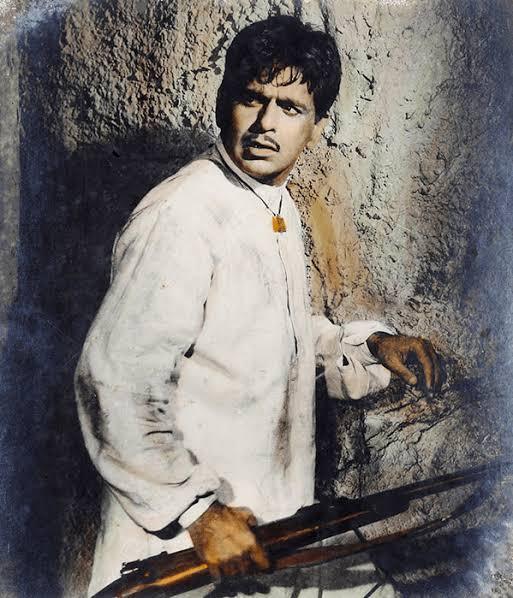
*Dilip Kumar*
~ Dilip Kumar was born as Mohammed Yusuf Khan on 11 December 1922 in the Qissa Khawani Bazaar neighbourhood of Peshawar, a city in the North-West Frontier Province of British India (now in Pakistan).
🌹 Happy Birthday 🌹
5 notes
·
View notes
Text
South Saskatchewan
Next morning, I was super-efficient in packing up and left sharp at 7.45am (I've become even better at early departures in the Rockies, simply to avoid the crowds 🥴) as I had a long drive to do; over 600km to my next camping spot... Not sure I completely had thought this through when I booked it, but think I was lured by the 1-hour jump back in time when crossing into Saskatchewan, although the actual driving time stays the same of course!! 🤔
First Gmaps direction; turn left in 361km.... love it, those large-distance roads in Canada! 🙃 I was now officially on the Red Coat Trail but different to other provinces, I never saw any plaques or tourist info signs so I still don't really understand what it's about... I presume something with the army traveling west during the new frontier?? Now, it's just endless fields and sky which are pretty in their own right... Although I love my trees and forests, there's something special about this massive expanse of agricultural lands, a testament to human's ability to control the land. I did feel cheated, as the "Land of Living Skies" was yellow-grey both below and above the horizon with smoke turning everything dull... such a shame! On the way, there's really not much to see apart from the rare sunflower field 🤩, modern-day grain stores, cows and surprisingly lots of nodding donkeys that pump oil from the ground!
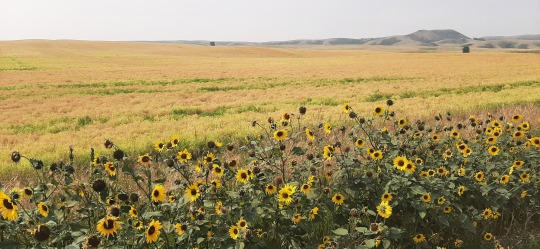

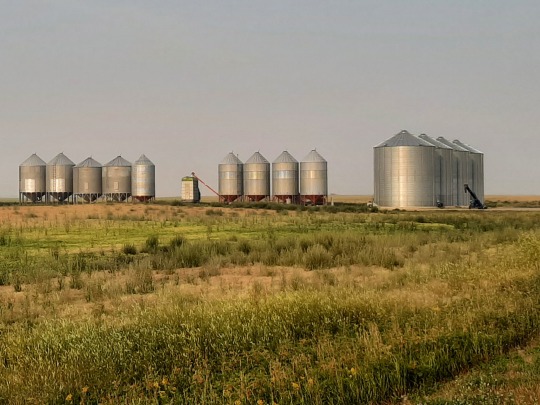
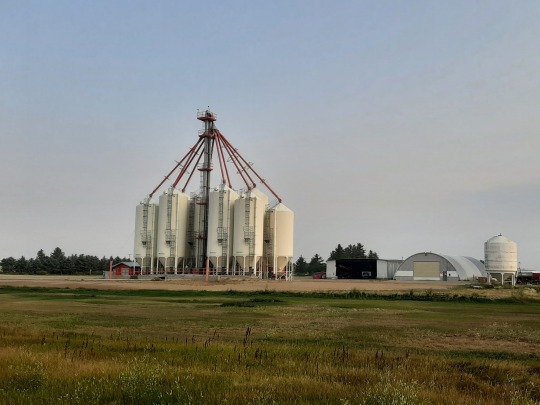


Close to half-way the province, I veered further south towards the US border onto gravel roads to see Castle Butte, a 200ft-high knoll left in the landscape during the Ice Age (not sure I trust that info, as I thought buttes are of volcanic origin). Looming high above the flat prairie land I tried to climb up it (where other people already were so I was not completely stupid yet) but it got too steep for my non-hiking shoes and then instead of coming down on my butt as I should have, I tried to walk it and ended up running at full speed down the slope... I got really extremely lucky I didn't fall and break any/all body parts!! 😳😳 I did end up semi-twisting both ankles which I still feel 2 weeks later, but instead of complaining I am grateful that that was the worst of it! Phew...


The adventures of the day didn't stop with that because a bit later I ran over and killed a duck! 😫 With lots of dark skid marks on the gravel, I only realized too late that there were 4 full-sized ducks sitting in the middle of the road and although I braked as much I safely could, I had no choice than to go over them and hope they all fit between my wheels... 3 survived (likely with a heart attack!) and one didn't. I've had very little roadkill in the 20+ years driving, and definitely nothing as big as this so that was quite upsetting!
My mood improved however when I arrived at Grasslands National Park, which consists of two blocks some 170km apart; the east block that I visited first protects a vast expanse of badlands, whereas the west block where I was camping that night represents Canada's largest tract of untouched native prairielands (which covered most of North America's central region until the settlers came ranching & farming). I'm trying not to overkill with pictures but both areas were very very pretty and I would urge anyone to make a trip out here!
On the east side, there's a few hikes but it was so hot that I simply drove along the Badlands Parkway with interpretative signs explaining the geology and the natural & human history of the area. The badlands seem at first glance quite monotone but then I discovered flowers, prickly pear cacti, gophers (ground squirrels of which I had already spotted lots on the road) and even a pronghorn antilope!
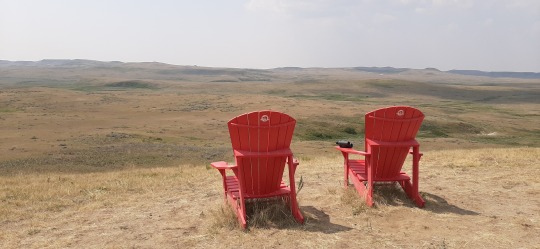
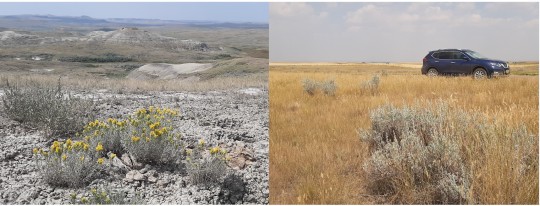

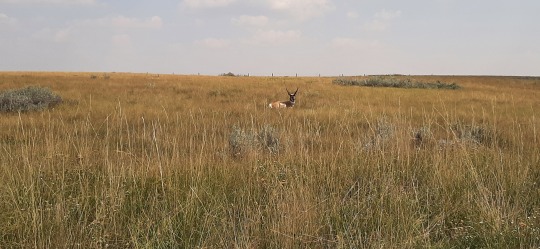
The clouds pushed by the wind kept changing the light patterns, highlighting in turn different hills, so it was great to sit for a while in a red chair and see the scenery constanly change.

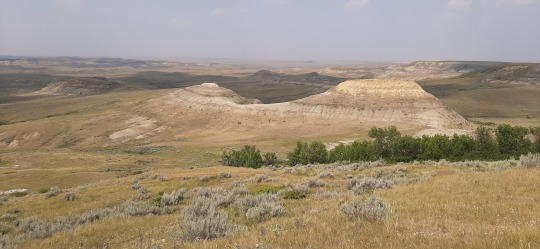

Hot and tired, I made the trek to the other block passing enroute another grain elevator, after which I set up camp on the beautiful prairie without a single tree (with a fence though to protect against the bison)! My pic of the sunset doesn't do it justice, but you can imagine how pretty the sky was, and as this is a dark sky preserve, I stayed up late (after midnight, which doesn't happen often anymore 😜) to watch the Milky Way in its full glory.
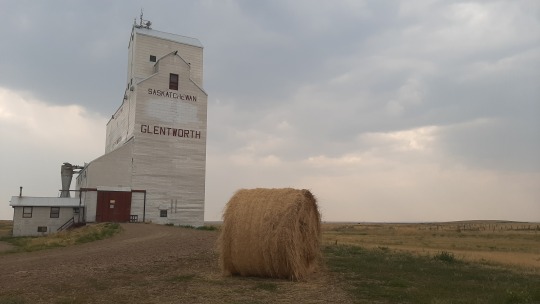

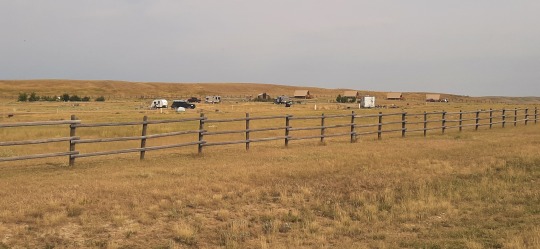
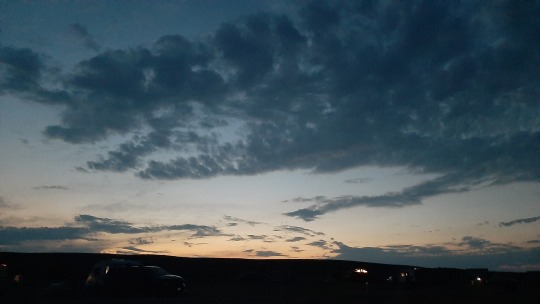
The next morning, I had a clear task; prairie dog and bison hunting, which are the two key species of the park. A gopher (top left pic) had already been running all morning around my site (he shouldn't have built his hole next to the firepit), so when I spotted the first prairie dog (top right pic) in one of the park's colonies or "dog towns" I was a bit confused as they looked the same to me! 😂 Turns out the prairie dogs are about twice the size and much more afraid of humans, although they loved eating the dead bugs from my car bumper and tires 😍 which meant that although it was impossible to get up close while walking as the first prairie dog would bark to warn the entire colony and then all disappeared, they had no problem with the car being close to them... funny how humans impact nature in weird ways sometimes!
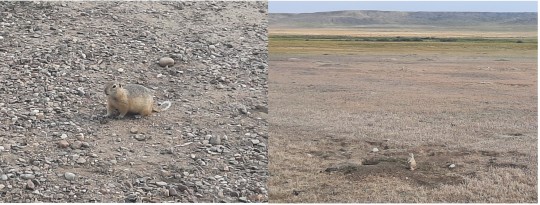
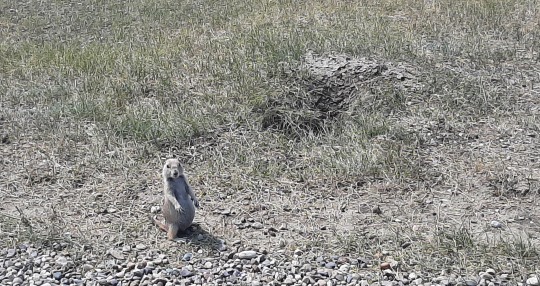
The bison were more elusive, as they truly don't like people, and although a herd of 500 of them is maintained in the park (with surplus animals being exported to other parks for reintroduction), the enclosed area is so large for them to roam in that they have plenty of places to hide. So I slowly made my way through the park with my binoculars on hand, learning along the way about a homestead that had managed to ranch cattle for a few years but then had to abandon because it was simply too hard to survive on the barren land, the different native grasses that make up the prairieland, a bison rubbing rock and a stone tipi ring, all the while enjoying the views.
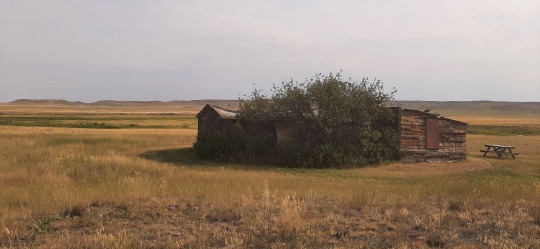

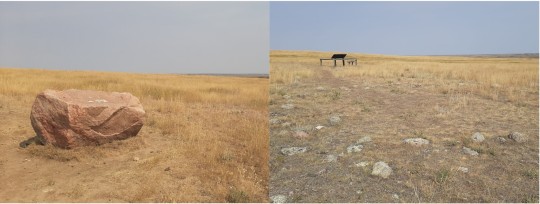
And then finally, when I had given up and was enroute to the village to get gas, I first saw a lone bison chugging through the grass, and then at the outermost corner of the enclosure, suddenly there was a group of 40 bison, including a few calves, that were grazing and rolling in the dirt. I promise I could see them much clearer in my binoculars than the little black specks in the picture! 😁

By the time I got to the village a massive rainstorm broke out so good reason to drop by the visitor centre and confirm it was a golden eagle (much bigger than bald eagles) that I had seen on a pole. I first didn't understand the gas "station" set-up as you needed to pull some levers to get it going, but finally managed to fill up the car once more.

That evening, the skies blackened suddenly with a thunderstorm and the wind was so strong that the tent started sliding away (the neighbour's did blow away) so I threw in as many stones I could find, parked my car in front of the tent to form a bit of a windshield and waited it out in the car... no way I was going to stay in the tent on this flat land! Luckily the storm passed quite quickly after which I had a drink with my neighbours to laugh it out, but I did end up sleeping in the car (for the first time and quite comfortably!) as rain came & went with some more lightning in the night.
When I drove off in the morning towards the Alberta border, I finally got the promised Living Skies Land with blue skies and golden fields, seeing the Prairies in all its hues 😊 I also saw another (the same??) herd of bisons on the way out of the park as well as another smaller golden eagle and several antelopes 😍
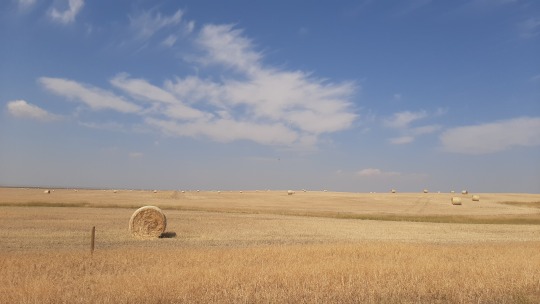
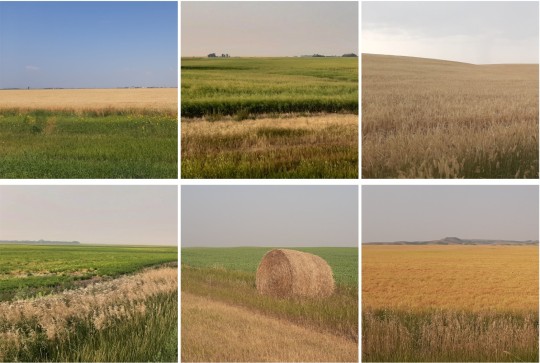
After a relatively short drive, I arrived at the Cypress Hills Interprovincial Park, which straddles the border between Saskatchewan and Alberta, consisting again of two blocks. Although I had planned again to visit the eastern block first and camp in the western one, a staff member pointed out that I was actually staying in the eastern block so that saved me another 1.5 hours drive! 👍 The park is unfortunately not very natural and has been developed as a resort with mini-golf, golf course, swimming pool etc so I was a bit disappointed. The nature that there is, is being protected because it's on a hill standing 500m above the plains so it was not glaciated and has therefore unique plant life (including trees) that doesn't occur anywhere else in the region but they haven't done a good job at protecting it! I had great internet at a viewpoint so ended up sitting on a bench there for 4 hours booking my next set of accommodations 😃 while occasionally hearing loud grunting lower on the hill which I presume was an angry moose so I didn't have any urge to go explore further!
Next day, I would be driving into Alberta, so this was Saskatchewan for now until I return further north on my way back. Adieu!

Wildlife: 1 coyote & 1 deer (Red Coat Trail), 100+ ground squirrels (gophers), 100+ prairie dogs, 43 bison in the afternoon and 50 bison in the morning, 2 golden eagles, 2 ferruginous hawks, 1 deer, 5 pronghorn antilopes (Grasslands), 3 red-tailed hawks & 3 deer (Cypress Hills)
SUPs: none
Hikes: no real ones, just lots of little sidetrips to viewpoints
Distance driven since the last map (I'm losing track of the weeks 😉 but it's been a while all the way from Sleeping Giant): 1,925 km
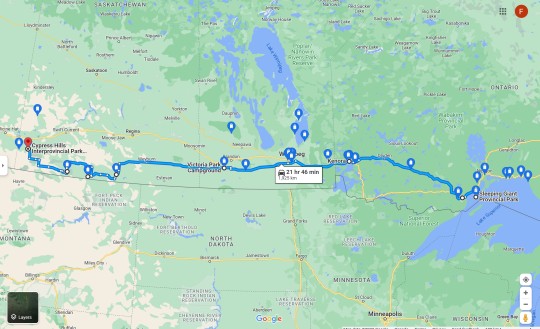
3 notes
·
View notes
Text


By the Swat river, Khyber Pakhtunkhwa, Pakistan
#swat#swat river#sunset#river#kpk#khyber pakhtunkhwa#nature#photography#Pakistan#nwfp#north west frontier province#own post
17 notes
·
View notes
Text
Events 8.12 (after 1900)
1914 – World War I: The United Kingdom and the British Empire declare war on Austria-Hungary. 1914 – World War I: The Battle of Halen a.k.a. Battle of the Silver Helmets a clash between large Belgian and German cavalry formations at Halen, Belgium. 1944 – Waffen-SS troops massacre 560 people in Sant'Anna di Stazzema. 1944 – Nazi German troops end the week-long Wola massacre, during which time at least 40,000 people are killed indiscriminately or in mass executions. 1944 – Alençon is liberated by General Philippe Leclerc de Hauteclocque, the first city in France to be liberated from the Nazis by French forces. 1948 – Babrra massacre: About 600 unarmed members of the Khudai Khidmatgar movement are shot dead on the orders of the Chief Minister of the North-West Frontier Province, Abdul Qayyum Khan Kashmiri, on Babrra ground in the Hashtnagar region of Charsadda District, North-West Frontier Province (now Khyber Pakhtunkhwa), Pakistan. 1950 – Korean War: Bloody Gulch massacre: Seventy-five American POWs are massacred by the North Korean Army. 1952 – The Night of the Murdered Poets: Thirteen prominent Jewish intellectuals are murdered in Moscow, Russia, Soviet Union. 1953 – First thermonuclear bomb test: The Soviet atomic bomb project continues with the detonation of "RDS-6s" (Joe 4) using a "layered" scheme. 1953 – The 7.2 Ms Ionian earthquake shakes the southern Ionian Islands with a maximum Mercalli intensity of X (Extreme). Between 445 and 800 people are killed. 1960 – Echo 1A, NASA's first successful communications satellite, is launched.x 1964 – South Africa is banned from the Olympic Games due to the country's racist policies. 1969 – Violence erupts after the Apprentice Boys of Derry march in Derry, Northern Ireland, resulting in a three-day communal riot known as the Battle of the Bogside. 1976 – Between 1,000 and 3,500 Palestinians are killed in the Tel al-Zaatar massacre, one of the bloodiest events of the Lebanese Civil War. 1977 – The first free flight of the Space Shuttle Enterprise. 1977 – The Sri Lanka Riots: Targeting the minority Sri Lankan Tamils, begin, less than a month after the United National Party came to power. Over 300 Tamils are killed. 1981 – The IBM Personal Computer is released. 1985 – Japan Airlines Flight 123 crashes into Osutaka ridge in Gunma Prefecture, Japan, killing 520, to become the worst single-plane air disaster. 1990 – Sue, the largest and most complete Tyrannosaurus rex skeleton found to date, is discovered by Sue Hendrickson in South Dakota. 1992 – Canada, Mexico and the United States announce completion of negotiations for the North American Free Trade Agreement (NAFTA). 1994 – Major League Baseball players go on strike, eventually forcing the cancellation of the 1994 World Series. 2000 – The Russian Navy submarine Kursk explodes and sinks in the Barents Sea during a military exercise, killing her entire 118-man crew. 2015 – At least two massive explosions kill 173 people and injure nearly 800 more in Tianjin, China. 2016 – Syrian civil war: The Syrian Democratic Forces (SDF) capture the city of Manbij from the Islamic State of Iraq and the Levant (ISIL). 2018 – Thirty-nine civilians, including a dozen children, are killed in an explosion at a weapons depot in Sarmada, Syria. 2021 – Six people, five victims and the perpetrator are killed in Keyham, Plymouth in the worst mass shooting in the UK since 2010.
2 notes
·
View notes
Text
Saturday, November 23, 2024
Canada Fears Trump’s Mass Deportations Will Push Migrants North (NYT) At 5,525 miles, it is the longest border between any two countries. And that border—separating the United States and Canada—seems set to become a flashpoint between the close allies as President-elect Donald J. Trump prepares to take power. The Canadian authorities fear that Mr. Trump’s promised mass deportations will push migrants north, while allies of the incoming president headed for key roles in his administration have raised alarms over a recent spike in undocumented migrants crossing from Canada to the United States. Canadian officials are drawing up plans to add patrols, buy new vehicles and set up emergency reception facilities at the border between New York State and the province of Quebec to prepare for what they expect to be a surge in migrants because of Mr. Trump’s hard line on deportations. The northern border is also a focus of people named to top positions in the Trump administration, including his new border czar, Tom Homan. He has described the frontier as a major security vulnerability because of what he described as insufficient checks on people entering the United States.
Seattle Power Outages Could Linger as Strong Storms Pelt the West Coast (NYT) Utility crews across the Seattle region scrambled to clear fallen trees and restore power to nearly 300,000 homes, schools and businesses that remained without electricity on Thursday. The storm also deluged Northern California, where firefighters made water rescues as creeks overflowed from torrential rain. Officials said the outages in Seattle could last into the weekend, even as another round of heavy wind and rain is expected, stretching even farther south this time. Fed by an atmospheric river funneling water from the Pacific Ocean, the storm killed at least two people as it tore through Western Washington this week. It moved south and parked over Northern California, flooding roadways and disrupting transit and air travel. Nearly seven inches of rain fell Wednesday at the airport in Santa Rosa, in California’s wine country north of San Francisco, breaking a one-day record.
It’s the divisions that bring some together in a county in Washington state (NPR) In a community center overlooking the Salish Sea in Washington state, about 30 people are around a long table, talking and arguing. It’s earlier this year, but the conversation has turned back to the assault on the U.S. Capitol building on Jan. 6, 2021. David Fox, a Democrat at the table, says there’s no evidence to back up Donald Trump’s claim that as president he asked the military to protect lawmakers before the building was breached. Sandi Lytle, a Republican, argues that this should have been the job of then-Speaker of the House Nancy Pelosi. They go back and forth, interrupting, raising voices, as they try to convince each other. Though they argue, the two are friends who meet to do this most Thursday mornings. “I love it because this is how the country is,” Lytle said. “This is who we are as a nation. We’ve got to have the discussion, the debate, the back and forth. That’s how we get to the best answers.” Attendees say the group has met to discuss politics for some three decades. While the discussions are open to anyone in the community, it is mainly older adults who attend. Many said they like being in a place where their ideas are challenged, where they learn something and can interact face-to-face. “Whatever happens, whatever difficulties confront us, what’s most important to me is that we don’t go further and further away from each other,” Fox said.
42% (WSJ) That’s the share of crop farmhands who aren’t legally authorized to work in the U.S., according to the Labor Department. The agriculture industry is bracing for Trump’s immigration crackdown because migrants do some of its most challenging jobs, such as picking fruit, operating machinery and slaughtering livestock.
Brazilian Police Accuse Bolsonaro of Plotting a Coup (NYT) The Brazilian authorities announced on Thursday that they were recommending criminal charges against former far-right President Jair Bolsonaro over his role in a broad plot to cling to power after he lost the 2022 presidential election. The accusations sharply escalate Mr. Bolsonaro’s legal troubles and highlight the extent of what the authorities have called an organized attempt to subvert Brazil’s democracy. After Mr. Bolsonaro narrowly lost to the current president, Luiz Inácio Lula da Silva, a leftist, he refused to acknowledge defeat but left office anyway. Brazil’s federal police urged prosecutors to charge Mr. Bolsonaro and three dozen others, including members of his inner circle, for the crimes of “violent abolition of the democratic rule of law, coup d’état and criminal organization.” The charges are the culmination of a sweeping two-year investigation in which police raided homes and offices, arrested senior aides to Mr. Bolsonaro and secured confessions and plea deals with people involved in the plot.
Germans are working less, and even the Swiss are cutting back (NZZ/Switzerland) Why have the Germans become so fragile? During the pandemic, the average German worker took 20 sick days. But instead of declining after the coronavirus crisis, absenteeism surged. By 2022, the average German employee was out sick for an astonishing 25 days, according to the World Health Organization. Yet sick leave is only part of the story. Germans also enjoy an average of 31 vacation days annually. Add six weeks of holidays to three to four weeks of sick leave, and it’s little wonder Germany’s economy is once again being likened to the “sick man of Europe.” Germany is far from an outlier. Across the continent, taking sick leave seems to have grown more common. Across Europe, a cultural shift is underway as societies lean further into leisure and aspirations outside of work. Since the turn of the millennium, working hours have declined across all advanced economies. Austria has seen the steepest drop, with annual working hours falling by 151—equivalent to about 19 workdays. Even Switzerland is not immune to this trend. Swiss employees now work, on average, 138 hours less per year than they did in 2000.
Fearing war, Georgia chooses a return to Russia’s embrace (Washington Post) After a contentious parliamentary election, Georgia—a small nation once part of the Soviet Union—finds itself sliding back into Russia’s orbit following decades of seeking greater integration with the West. The ruling Georgian Dream party, adopting a pro-Russian stance, declared victory in October’s elections after winning 54 percent of the vote and running a campaign with a stark warning: Align with the West and suffer Ukraine’s fate. The opposition has rejected the election as stolen, but it does appear that the ruling party successfully capitalized on a fragmented opposition and Georgians’ fear of war, aided by Russian disinformation and a patchy record from the West when it comes to supporting nations seeking to leave Russia’s sphere of influence. After years of waning influence in the region, Russia’s invasion of Ukraine has had a chilling effect on neighboring countries seeking closer ties with the West.
Second Australian teen dies in tainted alcohol case in Laos that has killed 6 tourists (AP) A second Australian teenager who fell critically ill after drinking tainted alcohol in Laos has died in a hospital in Bangkok, her family said Friday, bringing the death toll in the mass poisoning of foreign tourists to six. Holly Bowles, 19, had been in critical condition on life support following the poisoning in Laos more than a week ago. Methanol is sometimes added to mixed drinks at disreputable bars as a cheaper alternative to ethanol, but can cause severe poisoning or death. It is also a byproduct of poorly distilled homebrew liquor, and could have found its way into bar drinks inadvertently. Landlocked Laos is one of Southeast Asia’s poorest nations and a popular tourist destination. Vang Vieng is particularly popular among backpackers seeking partying and adventure sports.
ICC warrants put spotlight on Israel and its U.S. defenders (Washington Post) Judging by the American reaction, you would think the International Criminal Court was based in Beijing or Moscow. On Thursday, a set of judges at the ICC, which is headquartered in The Hague, the administrative capital of the Netherlands, issued arrest warrants for Israeli Prime Minister Benjamin Netanyahu and his former defense minister Yoav Gallant for “crimes against humanity and war crimes” over Israel’s military operations in the Gaza Strip. They also issued an arrest warrant for Mohammed Deif, Hamas military leader in Gaza; he is believed dead. The move follows some six months of deliberations after an application made by the court’s chief prosecutor, Karim Khan, in May. The court said it found “reasonable grounds” to believe Netanyahu and Gallant bore responsibility for crimes including the use of starvation as a method of war and for “murder, persecution, and other inhumane acts.” Khan argued that there was clear evidence to demonstrate the Israeli ministers had presided over a policy that “systematically deprived the civilian population of Gaza of objects indispensable to human survival.” Israeli officials and lawmakers from across the political spectrum, including Netanyahu and Gallant themselves, denounced the warrants as the workings of the “enemy of humanity,” proof of an international system brimming with “bias” and “antisemitism,” and interference in Israel’s pursuit of a just war in the wake of Hamas’s terrorist strike last October. In Washington, their indignation and fury was echoed. The Biden administration said it “fundamentally rejects” the ICC’s decision, and questioned the ICC’s jurisdiction in the matter. President Joe Biden called the warrants “outrageous.” Republican lawmakers were more blunt in their criticism: Sen. Tom Cotton (R-Arkansas) lambasted the U.N.-forged entity as a “kangaroo court” and labeled Khan a “deranged fanatic,” warning in a social media post that Congress would take punitive measures against the ICC. Sen. Lindsey Graham (R-South Carolina) said the ICC was a “dangerous joke” and called for U.S. sanctions on the body and its members. Netanyahu joins an ignominious list of leaders pursued by the ICC that includes Sudan’s Omar al-Bashir, Libya’s late leader Moammar Gaddafi, and Serbia’s Slobodan Milosevic and Russian President Vladimir Putin.
Inside ‘ruthless’ gang-controlled gold mines (BBC) A mine in the small South African town of Stilfontein, south-west of Johannesburg, is at the centre of global attention after a government minister promised to “smoke out” the hundreds of illegal miners working underground to extract gold. Ndumiso, a 52-year-old man using a pseudonym to avoid reprisals from mining gangs, is one of them. Ndumiso told the BBC that after being laid off by a big mining firm, he decided to join the gang in its underground world to become what is known as a “zama zama”, an illegal miner. He digs for the precious metal and surfaces every three months or so to sell it on the black market for a huge profit, earning more than he ever did before—though the risks now are far higher. “The underground life is ruthless. Many do not make it out alive,” he said. “In one level of the shaft there are bodies and skeletons. We call that the zama-zama graveyard.” But for those who survive, like Ndumiso, the job can be lucrative.
Police find shoe thief at a kindergarten is actually a weasel (Washington Post) Children’s shoes were disappearing in droves from a local kindergarten—and it worried parents and teachers so much that the police were called. At the scene of the crime, in southwest Japan, shoes were scattered across the school grounds—some in a pile by the entrance, others stuck in the fence. It looked like the work of a clumsy or hurried thief. “We thought we were dealing with someone disturbed, someone with an obsession with children’s shoes perhaps,” the deputy of Kasuya police station in Fukuoka, Hiroaki Inada, told The Washington Post in a phone interview. Police installed three cameras and began investigating the incidents on suspicion of theft. The culprit was caught red-handed. A sneaky weasel could be seen cautiously approaching cubbyholes storing children’s shoes at 7:40 p.m., before dashing off with a single white shoe in its mouth. The kids loved the weasel video, and their shoe cubbyholes have been covered with netting to prevent future thefts.
0 notes
Text
Battle of Saragarhi
Context: September 12 marks the 127th anniversary of the Battle of Saragarhi, regarded today as one of the finest last stands in global military history. About Battle of Saragarhi Saragarhi was the communication tower between Fort Lockhart and Fort Gulistan. The two forts in the rugged North West Frontier Province (NWFP), now in Pakistan, were built by Maharaja Ranjit Singh but renamed by the…
0 notes
Text
THE BIGGEST LIE IN THE WORLD IS THAT PAKISTAN IS AN ISLAMIC REPUBLIC.
Capital punishment in Islam is traditionally regulated by the Islamic law (sharīʿah), which derived from the Quran, ḥadīth literature, and sunnah (accounts of the sayings and living habits attributed to the Islamic prophet Muhammad during his lifetime).] Crimes according to the sharīʿa law which could result in capital punishment include apostasy from Islam, murder, rape, adultery, homosexuality, etc. Death penalty is in use in many Muslim-majority countries, where it is utilized as sharīʿah-prescribed punishment for crimes such as apostasy from Islam, adultery, witchcraft, murder, rape, and publishing pornography.[5List of crimes where capital punishment is applicable
Murder
Adultery of married personals
Apostasy
Espionage
Robbery
Witchcraft
Homosexuality
Kidnapping of women
Rebellion against Islam
Rape
Organized crime in Pakistan includes fraud, racketeering, drug trafficking, smuggling, money laundering, extortion, ransom, political violence, etc. Terrorist attacks became common during the 2000s, especially in North-West Frontier Province, the Federally Administered Tribal Areas, Balochistan, Karachi and Lahore. Vehicle theft is common, particularly in the large cities.
Black marketing
bombing
drug trafficking,
extortion
fire
fraud,
hoarding
racketeering,
money laundering,
political violence,
racketeering
ransom,
smuggling,
stealing
Terrorist attacks.
Vehicle theft
It is not true. Pakistan is neither ISLAMIC nor REPUBLIC. There is no Shariah Law, therefore it is not ISLAMIC. There is Rule of Law, Equality Freedom and Jussive for the common man therefore it is neither DEMOCRATIC nor REPUBLIC.
The JUDICIARY including but not limited to Judges, the Lawyers and the Clerks are sold to the highest bidder. The poor people have no money so they cannot afford to buy justice. WHAT A SHAME!
The Government, its Ministers, Officials and the public is corrupt from top to bottom They tell lies day and night from both sides of their mouth. They are all HYPOCRITES AND BLOODY LIARS, PERIOD!
0 notes
Text
Five steps of Wikipedia for Friday, 5th April 2024
Welcome, bienvenue, tervetuloa, karibu 🤗 Five steps of Wikipedia from "Veyyalore Town Panchayat" to "1946 Indian provincial elections". 🪜👣

Start page 👣🏁: Veyyalore Town Panchayat "Veyyalore Town Panchayat (Veyyalore Gram Panchayat), is located in Keerapalayam district in Cuddalore district of Tamil Nadu. This panchayat falls under Bhuvanagiri Assembly constituency and Chidambaram Lok Sabha constituency. This panchayat has a total of 7 panchayat constituencies. 7 Panchayat..."
Step 1️⃣ 👣: Chidambaram Lok Sabha constituency "Chidambaram is a Lok Sabha (Parliament of India) constituency in Tamil Nadu. Its Tamil Nadu Parliamentary Constituency number is 27 of 39. The seat is reserved for scheduled castes. It spread on district of Ariyalur and Cuddalore...."
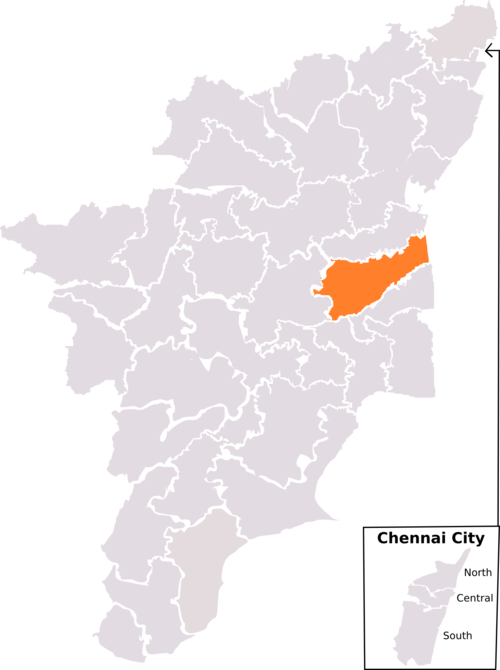
Image licensed under CC BY-SA 3.0? by Nader85021
Step 2️⃣ 👣: 1977 Indian general election "General elections were held in India between 16 and 20 March 1977 to elect the members of the sixth Lok Sabha. The elections took place during the Emergency period, which expired on 21 March 1977, shortly before the final results were announced.The elections resulted in a heavy defeat for the Indian..."

Image licensed under CC BY-SA 3.0? by Furfur
Step 3️⃣ 👣: 1937 Indian provincial elections "Provincial elections were held in British India in the winter of 1936-37 as mandated by the Government of India Act 1935. Elections were held in eleven provinces - Madras, Central Provinces, Bihar, Orissa, the United Provinces, the Bombay Presidency, Assam, the North-West Frontier Province, Bengal,..."
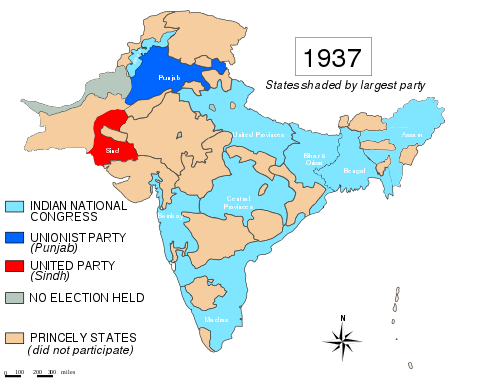
Image licensed under CC BY-SA 4.0? by RaviC
Step 4️⃣ 👣: 1930 Indian general election "General elections were held in British India in September 1930. They were boycotted by the Indian National Congress and marked by public apathy. The newly elected Central Legislative Assembly met for the first time on 14 January 1931...."
Step 5️⃣ 👣: 1946 Indian provincial elections "Provincial elections were held in British India in January 1946 to elect members of the legislative councils of the Indian provinces. The consummation of British rule in India were the 1945/1946 elections. As minor political parties were eliminated, the political scene became restricted to the..."
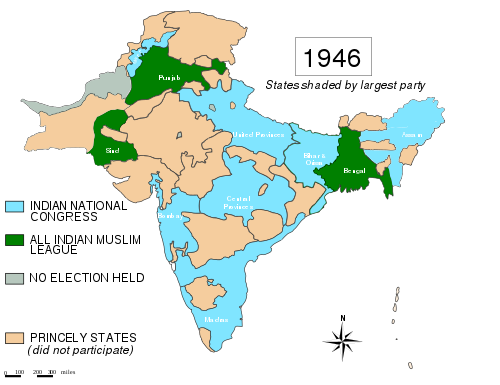
Image licensed under CC BY-SA 4.0? by RaviC
0 notes
Text

Bettle Saragarhi The Legendary Battle of the 21 Brave Soldiers
On September 12, 1897, 21 brave soldiers of the British Indian Army fought against a force of 10,000 Afghan tribesmen at a remote outpost in Saragarhi, located in the North-West Frontier Province, now Khyber Pakhtunkhwa, Pakistan. This battle, also known as the Battle of Saragarhi, is regarded as one of the greatest last stands in military history.
#saragarhi#sikhhistory#sikh community#khalsa#gurugovind singh#india#afgan#saragarhi battel#hiistory#army#soldier
0 notes